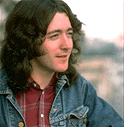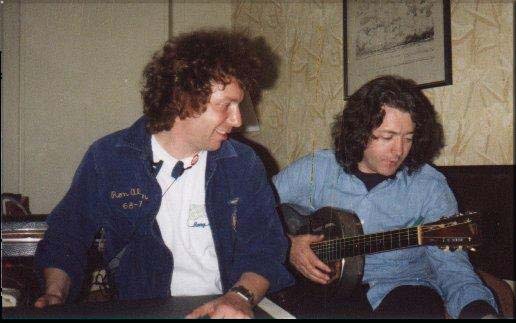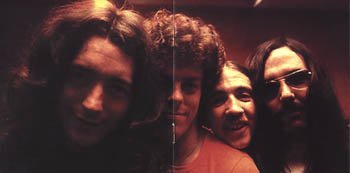


How do you sum up the life and music of a creative genius like Rory Gallagher? I tried to pay my considerable respects in the three specials I broadcast on CKCU-FM in 1995 and 1996. I was a little bit shaky during the first one in July 1995, shortly after Rory's passing. His death came as a terrible shock. I hadn't known of his poor health but my good friend Paul Fenton had worried about him since at least 1985, when he introduced me to Rory in Ottawa. I hope to both describe Rory to you and pay tribute to him and his music; in fact, one cannot do one without accomplishing the other.
Creem magazine once called Rory "the best normal guitar player in the world" and few superlatives could describe him better. Utterly without pretension or conceit, he was a gentle, private man who became, in Gerry McAvoy's words "a lion" and "regal" on stage. He liked to be by himself before a performance to meditate, collect his thoughts, to go into that special place where he became one with the music and then he would explode onstage, passionate, fevered, the way a Robert Johnson or a Son House would. In the mid-1980's the Toronto Globe & Mail (Toronto was always a Rory hotbed) paid him tribute in an excellent favourable review, describing him as a beloved living legend. He was still knocking our socks off.
I called him a survivor, one who had refused to compromise and who continued to carry the late 1960's and early 1970's "guitar hero" mantle with pride, dignity and creativeness. None compared with Rory for his integrity, personal honour, class and manners. In retrospect I think the end of his life began with the shabby way the superior Jinx album was handled by Chrysalis Records and by the strange turn of corporate FM radio in the United States in the early-to-mid 1980's, where they thought there was no place for someone who didn't conform to their jaundiced, plastic marketing strategy. Paul is sure Rory was very disappointed and surprised by the way this masterpiece LP was denied credit or even the chance to breathe, to make a life for itself in the hearts of the listening audience and record buying public.
Rory never was a conformist. Growing up in Ireland, (I had the distinct impression that) early on he had intended or he and his family were considering the Roman Catholic priesthood but he went in an entirely different direction, to playing with Show Bands, doing a variety of show tunes, top 40 material and the like. When he founded the first lineup of Taste in 1965 they were the first power trio in the history of rock, predating Cream by about a year and the Jimi Hendrix Experience by almost two years. Rory was reputed to have had the 'longest hair in Ireland' and certainly stood out in a crowd. Though he was from the south, he chose to go to Belfast and it became his artistic home until he migrated to London and he played there extensively, even during the height of "the troubles", something most other Irish artists avoided. The people of Belfast loved him even more for this courage.
His mastery of the instrument was and is unparalleled in rock and blues. The night we celebrated a "National" holiday with him with eleven guitars, electric and acoustic, all in varied tunings (D modal, G, D, E, C, regular) he went from instrument to instrument, playing lead licks, slide, chords as if it was one guitar and all were tuned the same. Never a pause for thought, just beautiful, natural fluid playing. He cranked up the amplifier in the case of the Silvertone Paul Fenton had brought. "Rory! Shhh! Be careful!" It was in the middle of the night in a fairly respectable hotel, after all. He grinned devilishly and played some loud, bitchin' slide, enjoying the moment. No other names come to mind when one thinks of his mastery of the styles of Blind Boy Fuller, Blind Blake, Leadbelly and National "Rag" blues guitarists. He simply had no equals.
Let's not forget his work with Muddy Waters, at the precocious age of 24, more than a decade before Eric Clapton and Johnny Winter played with the maestro. I think in Johnny's case at least, he harboured some jealousy towards Rory until Paul acted as a peacemaker, chilling Johnny to the point where he actually said "Yeah, man, I like Rory, I like his stuff a lot, he's great." He recorded with Jerry Lee Lewis before Keith Richards, helped out childhood hero and skiffle great Lonnie Donegan on an LP, Mike Batt, the Box of Frogs on both their post-Yardbirds get-togethers and many more. This was among his most exciting and interesting work; he could play anything and was an incredibly accomplished and eclectic artist. I don't know if he had actually 'auditioned' for the Rolling Stones after Mick Taylor left, but he did talk about jamming with Keith. I may be wrong, but I think he was a bit tender about the subject so we avoided it out of respect and we held the opinion that the Stones were looney not to have offered him the post. "Keith is a fantastic rhythm guitarist, but he's crazy," Rory said. Hey, maybe he turned them down!?
He was also as big a fan of the Beatles as many of us: "I once flew on the same plane as George Harrison," he told us with a wide-eyed delight. Earlier in the night, during the concert, he had segued into the Beatles' "Rain" during a fascinating improvisation. He also told us how interesting he found Syd Barrett when he saw him play with Pink Floyd in the late 60's and how troubled he was that the black blues players were getting neither the financial nor artistic credit they were due. "I don't begrudge George Thorogood or Stevie Ray Vaughan their success, good for them, but who invented the music? It's sad that these people don't get the recognition they are due." He cited J.B. Hutto, Hubert Sumlin and several others.
We met him just after he had acquired his electric sitar in Texas in 1985 for the steep price of $1,000 US. (We were careful not to tell him that Paul had just wangled one for $300 CAN in a 'steal' of a deal.) He was also using an octaver (or octave divider) pedal extensively and a 'noise gate' because of all the pedals he ran, including an Ibanez Tube Screamer. He had a Vox AC 30, a Fender Twin and a couple of Marshall stacks (he always loved a nice full, 'blended' sound), with another stack by McAvoy so Gerry could hear him properly the night he played Barrymore's, June 6, 1985. The manager, Gord Rhodes, had bitten the bullet and forked over the very large sum of $4,800 US (not a huge payday by Rory's standards, but an interesting note) and while the club was perhaps 70-80% capacity compared to the wild overflow crowd of his November 1982 visit, the management and crowd were completely blown away. Owner Sonny Thompson sat there grinning at the end of the night in an empty club as we talked with Gerry McAvoy and Brendan O'Neill (also perfect gentlemen, by the way) and exclaimed for all to hear "Look out, Stevie Ray Vaughan! Wow!" Stevie had just played there months earlier.
In the dressing room, Rory stood alone, cocky, buzzed somewhat from the performance and the alcohol, joking and holding court with the small crowd until Paul brought him back to earth by giving him some Coricidin and Tylenol bottles (for slides). "W-w-what...remedy...medecine..." Rory was so excited he struggled for words. He wanted to know what drug came in the bottles so he could get some more. Paul said the Coricidin bottles were no longer available, but the brown ones we saw Rory use were Tylenol bottles, he loved them as well. I think it's accurate to say he preferred the glass slides for electric and a fairly heavy slide for acoustic and National resonator guitars, the metal's density helping with volume and sustain.
You should have seen and heard the remarkable August 1975 performance at Massey Hall in Toronto. Rory played the usual three hours, including a 45 minute acoustic set which absolutely destroyed the 3,000 plus overflow crowd. Spontaneous applause broke out many times during solos, such as when he rolled the tone pot or the volume pot for wah-wah and volume pedal effects and particularly when he played a gorgeous solo, muting the notes by fretting the strings on the frets and damping at the bridge with his right hand. Rory's audiences always had a very special love for the man and the obvious affection added to the magic of his performances. "Rory! Rory! Rory!" They would chant madly before, during and after the concerts. I find no sound on earth as chilling as a European crowd roaring "Rory!" at a Gallagher concert. Guaranteed goose bumps every time I hear it.

When Paul Fenton gave our beloved Rory his 1962 Supro Dual Tone as a thank you gift for inspiring him to make music his life, he wanted a photo to remember the night by. Someone took a picture of me sitting beside Rory on the bed while he played (seen here, Paul found the photo late 1998) I took one of Paul handing Rory an 11/16" socket like Lowell George used to play with (the shot looks like the 'joint passing' photo from the inside of the Layla LP). Rory wouldn't 'hot dog' for the photo with Paul, in fact he didn't want to 'pose' at all, he said emphatically, "No, it's not professional." So they stood side by side, smiling, holding the Supros while I took their picture. He was right, it looked much nicer and is a much more treasured keepsake.
Rory never to my knowledge did a video, though he did appear on TV and TV live broadcasts many times, mostly in Europe. He refused to take a commercial approach to his art, calling it "Too Max Factor for me. I'm not exactly Michael Jackson, you know." I don't know why he fell out of favour the way he did. Gerry and Brendan, in "Gallagher's Blues", a 1995 Irish TV memorial program said they thought he had actually made a decision to "conclude" his career (and by inference, his life). He knew some time before anyone else did that he was ill: "Face looks like marble, my blood burns just like toast." (Ghost Blues, 1990) Gary Moore saw Rory towards the end and found it unusual he was staying in a very posh London hotel, Rory apparently was usually more thrifty even though he owned many instruments and reportedly an Aston Martin sports car. Moore said he found him sad, quite lonely and was really worried about him. Rumours were rampant the last several years of his life about his poor health but Rory, ever proud, ever the private man, denied them vociferously until he fell seriously ill when on tour in 1994. We were spared that knowledge, due to the paucity of reports about him 1990-95, at least on this side of the ocean.
I had wanted him to get a new band together for some time, so it came as a pleasant surpise when I heard the news he and Brendan and Gerry were no longer together. Though I loved the other guys, I thought Rory needed a change, and what the hell, they could always play and record together again one day. Rory fantasized about recording with Bob Dylan and openly stated he wanted "Two more hit albums, in the top of the charts. Not for me, but for the fans, who've been so good to me all these years." No need to worry, Rory always gave us everything he had, he owed us nothing. In the end it cost him his life. The circumstances of his last years and his death I hope will be explained better by an official biographer. I know his brother Donal and his mother Monica will find someone to sum up this wonderful man's life and music.
Nothing, however, explains Rory Gallagher better than his signature song, his acoustic adaptation of the traditional/ Leadbelly song "Out on the Western Plain." When I played it on the July 1995 program on CKCU-FM, I really became choked up. I was afraid to listen to the tape for almost two weeks. Upon hearing the beautiful, intimate song again (it's such a lovely summary of how he married Celtic music with the Blues), I broke down and cried. For Rory's blues, for the loss of such a beautiful human being, for the awful way he died, almost but not quite surviving the unpleasant transplant operation.
In the end, we have our treasured memories and the rich recorded legacy of this very unique, brilliant "lion" of a man and I trust Donal will handle the catalogue and unreleased material with the care Rory would have wanted. I will never forget meeting him that night, being the last one out of his room, seeing him smiling at us as we left with all the gear (minus one guitar) and often imagine him returning to it upon closing the door, playing the blues alone after 5 am. So much unbelievably moving, honest music, a life lost far too young. Rory we will never forget you. Thank you for enriching our lives with your genius and God Bless.


